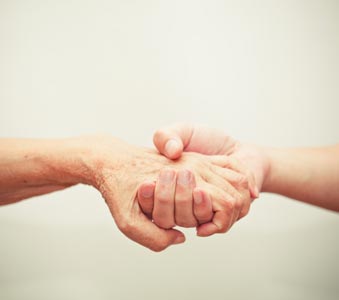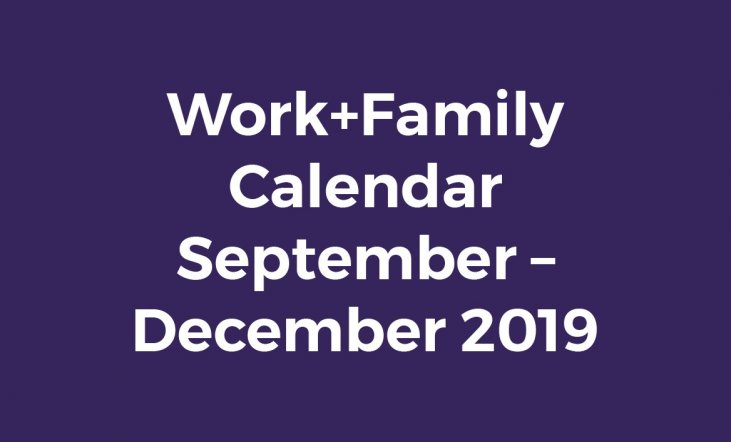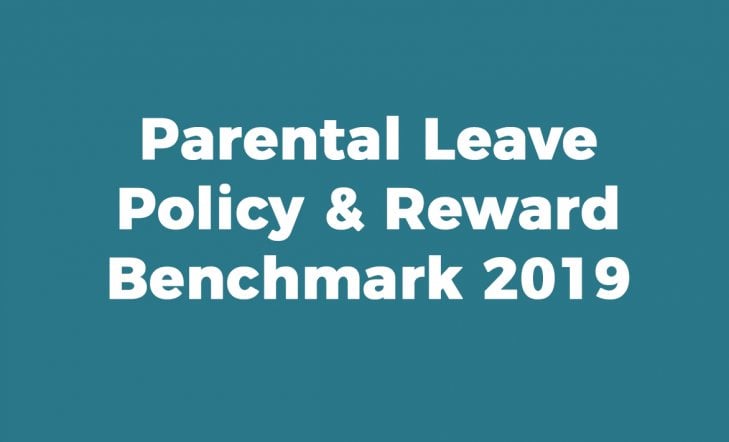Newsletter Sign Up
Regular work+family updates for
HR and diversity professionals.
My Family Care asks Suzanne: We hear more and more about the Sandwich generation, and how people are caring for both their children and their parents. But one of the things we fail to grasp is when we become carers ourselves. What is a carer? What advice do you have for someone who discovers they have gone from dependent to carer? And what support is available for carers?
Stuck in the middle and spread rather thinly
I am not sure that is quite what the term 'sandwich generation' is supposed to conjure up or represent, but that is so often how it feels.
Feeling caught in the middle of caring for both young and elderly dependents presents a number of complex challenges to society and has many caveats. Not only do you have to spread your time, energy and focus between two distinct generations with diverse emotional and physical needs, but run these in parallel with your own.
Trying to retain a sense of self, a modicum of health and wellbeing; managing a career trajectory whilst juggling roles of wife or husband, mum or dad, carer, pseudo psychologist, medic, cleaner, transporter of people and things, cook, administrator, and Operations Director can be challenging.
We all know it's a lengthy list and, more importantly, it's a list that keeps on giving - just like you.
The transition from dependent to carer can be tough
Here's the thing, we don't wake up one day transformed from a dependent into a carer, although this is more distinct for some. We don't enrol onto a 'carer for life' course or graduate omnipotent in all things caring, and nobody explains the role or tells you that it is unavailable part time.
There are limited self help manuals, handy tips and hints to prepare us - even if there were, we might be too busy to read them.
Nobody gives us a label that imbues and assigns us a 'nominated carer' with the ability to remove it at 6pm. It is more of an inherent expectation; an insidious and evolving process that is highly individual to our particular family dynamics and personal circumstances.
We will all deal with the issue of caring at some point
Caring is an issue which affects every family. At some point in our lives, we will all care for a loved one or need care ourselves; a sobering thought, I know. Caring touches every aspect of our lives - it's what makes us human. Without caring, one tilts towards the psychopathic.
The thing to bear in mind is that we are living longer, having families later, and are a more transient and mobile workforce; all this, coupled with multifaceted advances in research and technology, leave us with too many choices to make. Indeed, whilst all these have benefits, there are consequences too.
We are more likely to be exposed to chronic health problems, dementia, socio-economic changes, along with new and - at times - rather unreasonable expectations of ourselves and others. Caring can be exhausting unless it's balanced with self investment. This sounds a selfish notion, but it's not; it's what makes you a better, healthier person and carer.
Our personal resilience is absolutely key
My advice would be to invest in your personal resilience, first and foremost. Then plan, prepare, and organise - be as proactive as you can.
Have conversations early; make contingency plans, work together as a family and - where possible - with friends to share the load so that you can enjoy the caring bit, rather than resenting it.
We are often pretty hard on ourselves, but if you learn to share, delegate, play to family strengths and avoid repressing unresolved issues by either gaining resolution, or accepting them and letting them go, it helps everyone.
Avoid rushing in to your elderly dependent's cleaning and cooking while huffing and puffing about how busy you are. Instead, sit quietly with them, actively listening and talking to them; be engaged in their past, if that's what brings them happiness; share stories of your day and what the children are doing, involving them too when you can.
Just kindly connect - they will not be with you forever.
It's important to spend time with dependents
Make time with each dependent, young or old. It matters less about how long, but you do need to be 100% present during that time. Don't take calls, play on gadgets, or allow yourself to be distracted by the other things on your 'list'.
The priorities, thoughts, feelings, and behaviours of your child, teenager or elderly dependent will be very different to yours. You might not be on the same page, but try to empathise - use your imagination if you have to!
What can be learned by being a carer?
Caring builds transferable skills and helps you to be more patient, resilient, adaptable and knowledgeable. You need to realise that you can't do everything, for everyone, all the time.
Reflect on what is or isn't working, and why. This will help you reframe your priorities, but you have to give yourself some down time to do this.
Caring can be relentless and tiring, but also fun and uplifting. It is how you view things and how you choose to react that makes the difference, but it can be hard to keep buoyant when you are tired and stressed.
The need to re-energise once in a while
Try to manage your energy levels by regularly re-energising. Only you know what that looks like. Be quiet and reflective, even for a moment a day.
Have fun... Lock yourself in a darkened room if you have to, although I know I thrive much better if I can get outside in the fresh air with nature. Bike... walk... run... sit!
By caring for yourself, you will be better placed to care for others.
Finally, picture if you will: a stale, pale sandwich with curly frayed corners, very thinly spread... Now, a plump, nutritiously filled multigrain sandwich with lashings of filling!
Strange analogy - not sure if it works for you, but I hope it helps just a bit!
Suzanne Cook, Independent Coach, Creating Change












